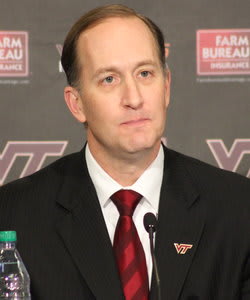Pt 1: VT, Beer Football

Advertisement

Picture this. A television camera scans the Lane Stadium crowd on a Saturday in September. It spots a fan, decked in orange and maroon, chomping down on a $9.99 turkey leg in one of his hands. In the other hand? A 12-ounce cup filled with Miller Lite.
For years, alcohol at university stadiums seemed like an almost taboo issue. Surely alcohol shouldn't be sold on a college campus, where the word tailgate essentially means chug as much beer and liquor as you can before kickoff, and then sneak some airplane bottles into the stadium. However, things could be changing as schools look to create new revenue streams.
"It seems like it's going that way, and I think you'll see more doing it," Virginia Tech athletics director Whit Babcock told the USA Today. "But it's a cultural issue at a place of higher education where there's a tradition (of not selling it). I don't know that it will be one of the top things on my agenda. But as more people do it … I'll definitely be watching."
A Virginia Tech athletics department spokesperson told HokieHaven.com that there has not been any consideration to date to sell alcohol at Lane Stadium. Clearly though, Babcock has an eye on the exploring the possibility in the future.
Around the country schools are opening the taps at their respective stadiums. West Virginia University began selling alcohol to the general public at Milan Puskar Stadium in 2011. After one season, the school reported a profit of $520,000, according to the West Virginia Gazette. In 2012, the University of Minnesota began selling alcohol to the public and reported over $900,000 in revenue, according to the Minneapolis Star Tribune.
In February of 2014, the University of Texas - which brought in the most revenue in the country last year as an athletic department at over $165,6591,486 according to The USA Today - announced plans to begin alcohol sales at sporting events. In early July, the school backtracked a little, as the university chancellor didn't approve sales at football games. Instead, the school will study the process at baseball, basketball, and track events before taking it to football.
The SEC has a policy banning public alcohol sales during its sporting events, while the University of Michigan announced earlier this year it decided against selling alcohol at the 'Big House.' The NCAA restricts alcohol sales at its 88 national championship events, such as the NCAA Men's Basketball Tournament. For regular seasons and conference tournaments, the decision is left up to the school and the conference.
At Syracuse, alcohol sales accounted for 47% of concession sales in the Carrier Dome in 2012, according to The Toledo Blade. Elsewhere in the ACC, Louisville has sold alcohol on campus for literally decades. According to an article published in the USA Today in 2012, alcohol sales at athletic events started before sports information director Kenny Klein's' then 28 years at the school. They even sell $1 beers at Friday home baseball games. Meanwhile, schools like Pittsburgh, Miami, and UNLV sell alcohol because their football stadiums are located off-campus.
In the Big Ten, suite-only alcohol sales are common. Iowa generated $111,000 in revenue back in 2010, Wisconsin generated $110,000, and Illinois generated $88,840, according to Eastern Iowa's newspaper, The Gazette. Of those four, Wisconsin and Illinois sold liquor in addition to beer and wine. Purdue - where new Virginia Tech President Timothy Sands previously worked - generated $40,050 in beer and wine sales.
Babcock previously served in the same position at Cincinnati, where beer was sold to the public at all sporting events. According to Babcock, he inherited the policy upon taking the post at Cincinnati and continued the practice during his tenure. "We didn't have any major alcohol-related incidents during my time," he told the USA Today. "It opened my eyes that it could be done in a responsible way."
Clearly, alcohol sales can provide value to Virginia Tech in the form of increased revenue. But is it worth the hassle? Won't selling alcohol at games increase drunken behavior in the stands?
West Virginia found incidents actually decreased by 30% once it began selling alcohol inside the stadium. Essentially, selling alcohol inside stadiums prevents the need to binge drink in the parking lot and sneak in as many airplane bottles as possible. In 2010, Minnesota reported 77 alcohol related incidents. In 2012, with alcohol for sale in the stadium, it reported 59.
Two schools aren't enough to draw a conclusion, but it indicates there is a way to balance the potential financial gain and the behavioral concerns.
So should this happen in Lane Stadium? How would it happen? These questions lead to what would be a complicated and drawn out process of evaluating the pros and cons. Check back tomorrow for part II of this story, detailing the basic process Virginia Tech would need to implement alcohol sales and the key players in what would be a long and open-ended discussion.
Note: Not including Rivals' premium sites, do not copy/paste and or repost this column outside of Rivals.com, particularly on message boards, chat rooms and e-mails, as it is a direct violation of copyright laws. Thank you.






